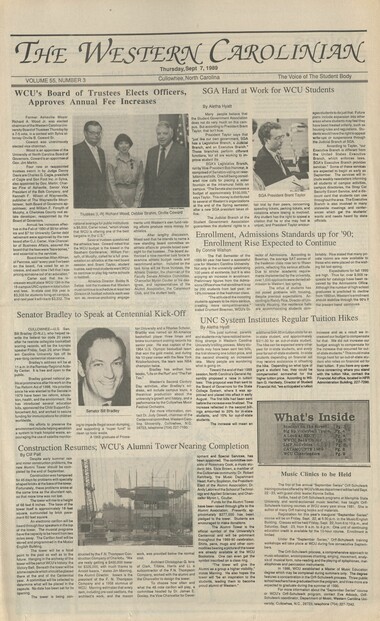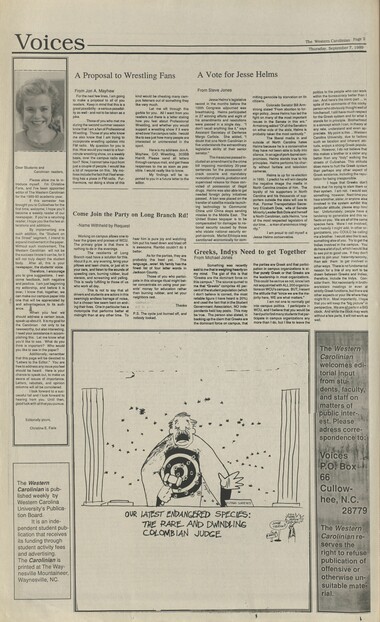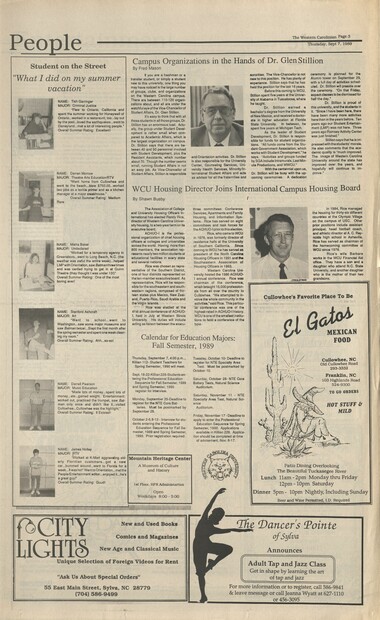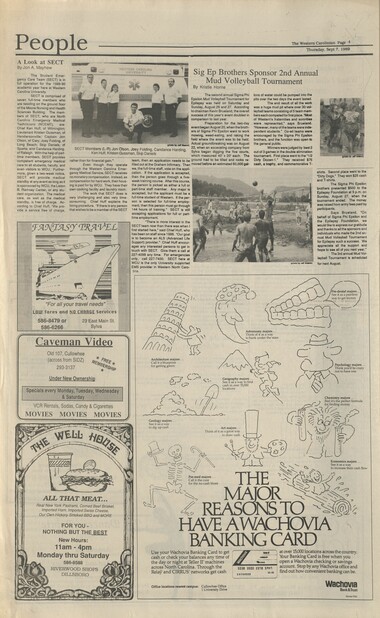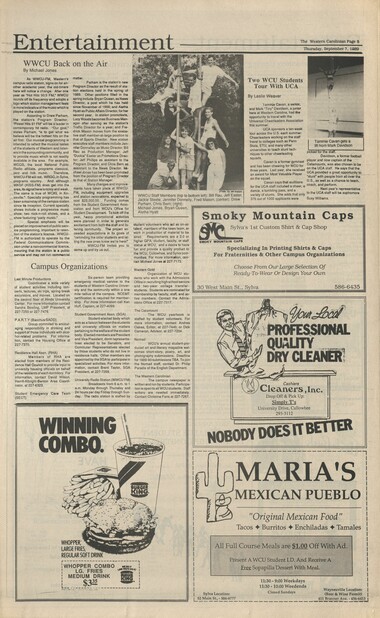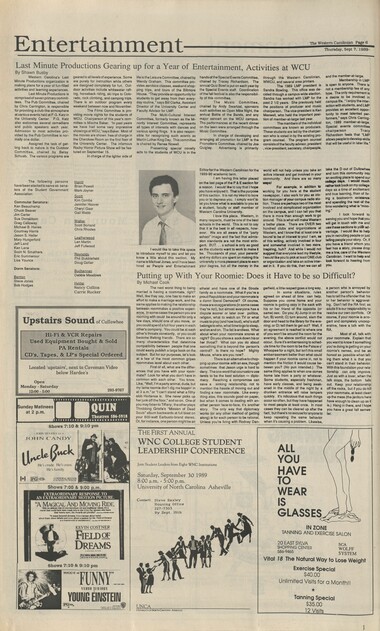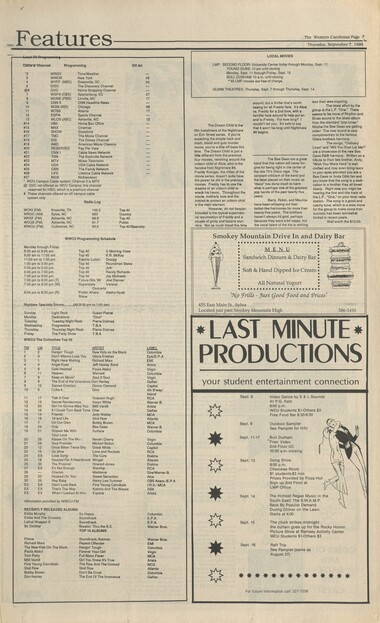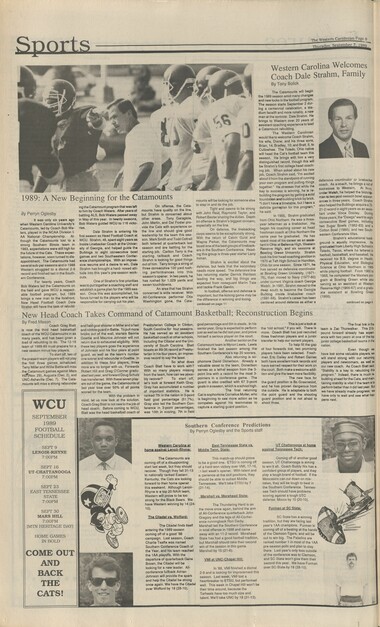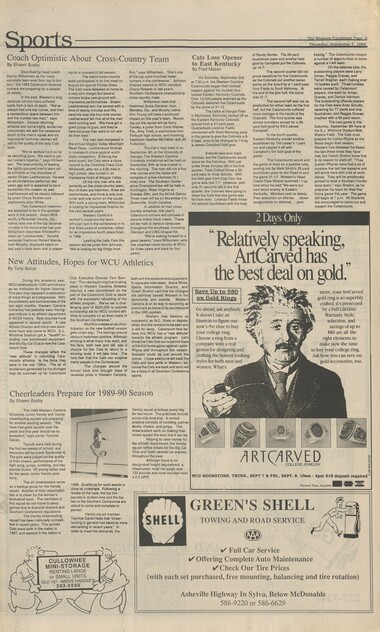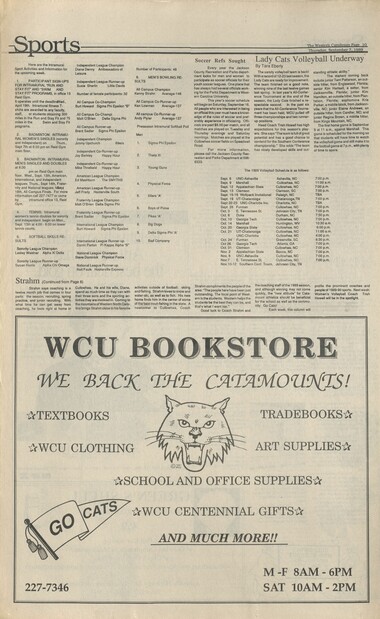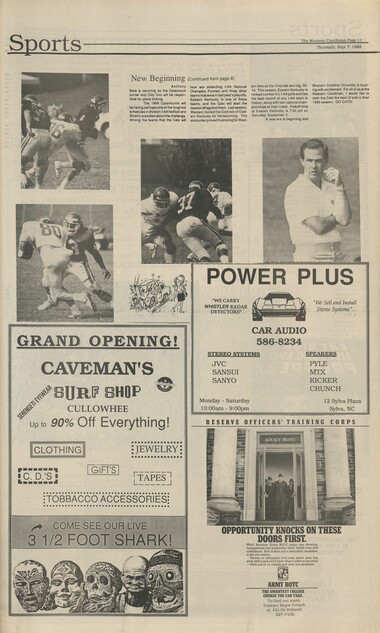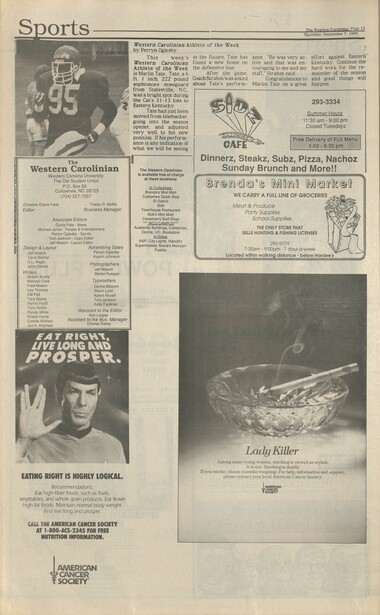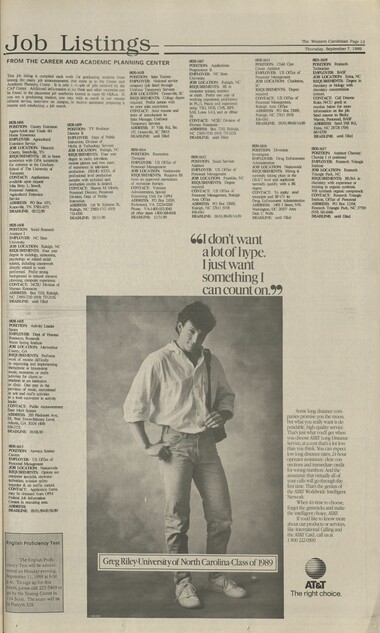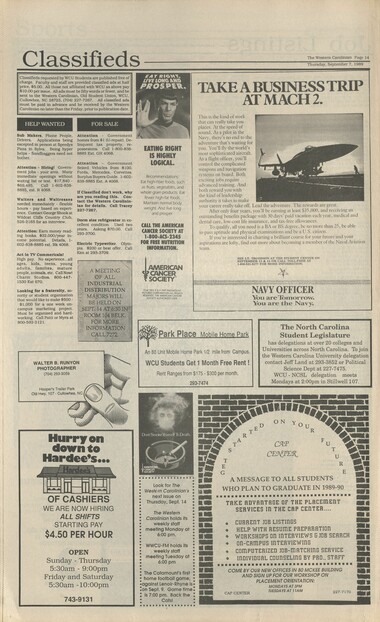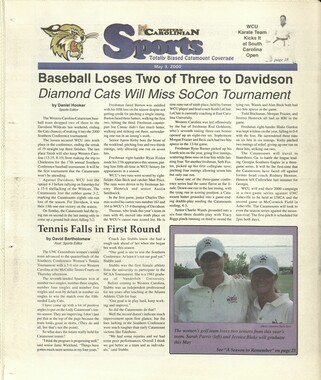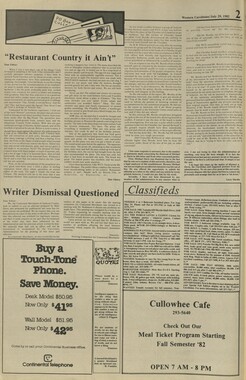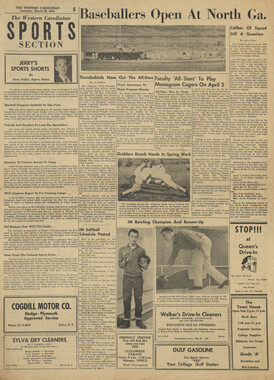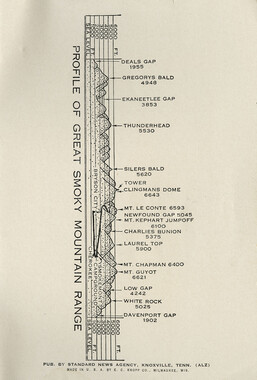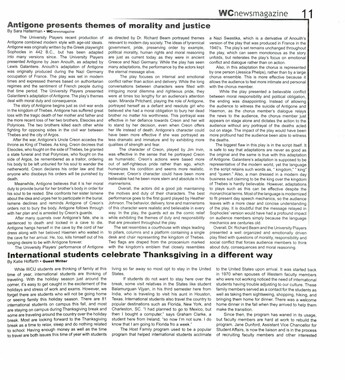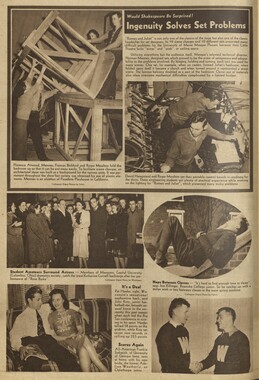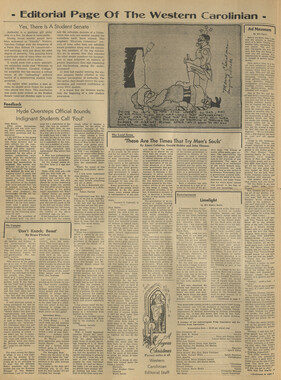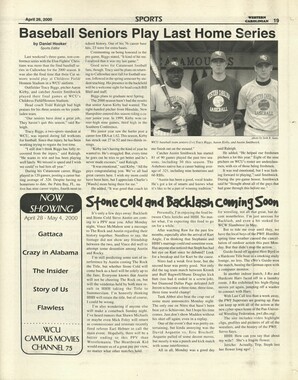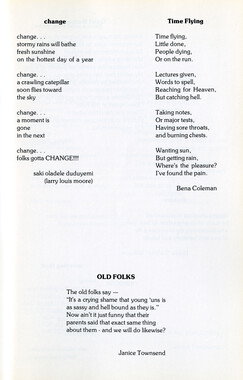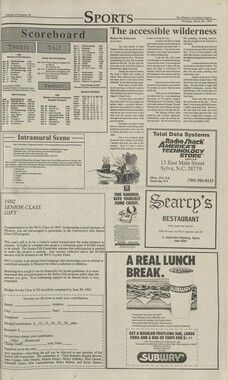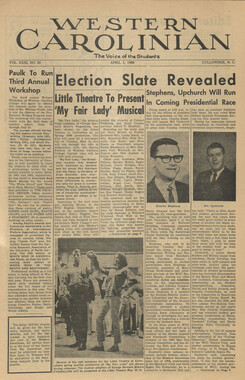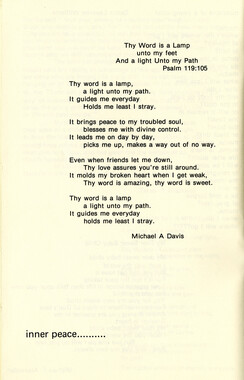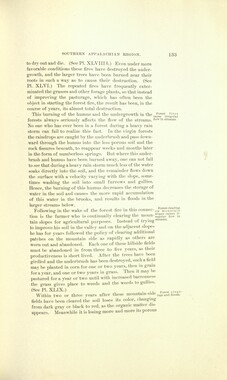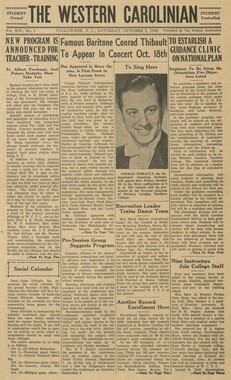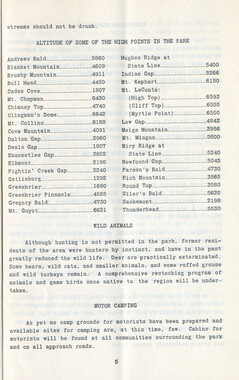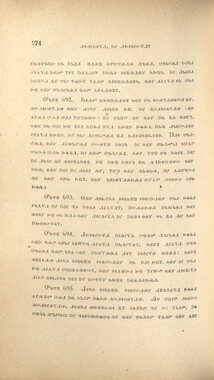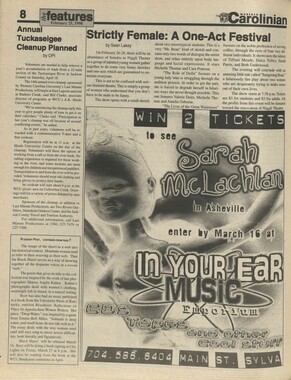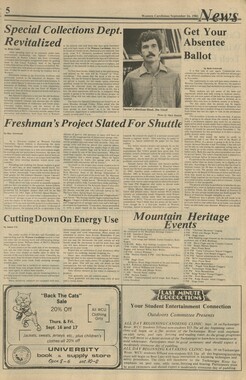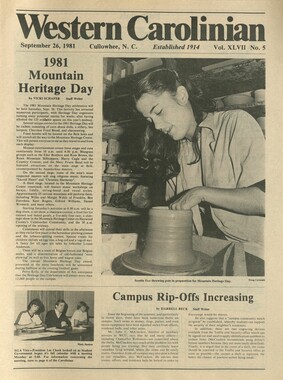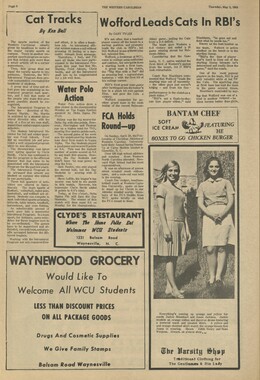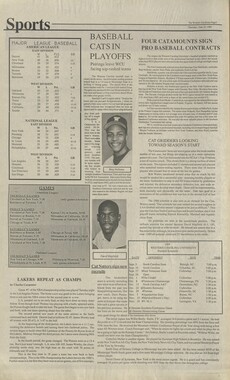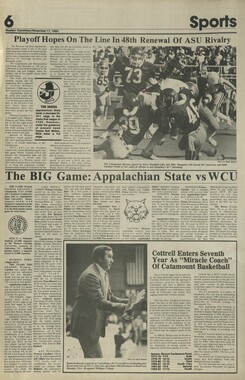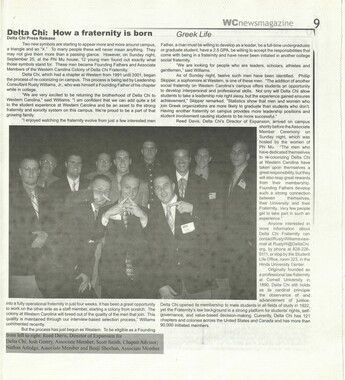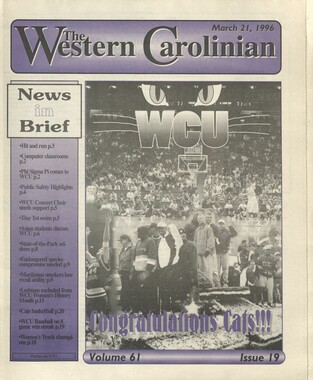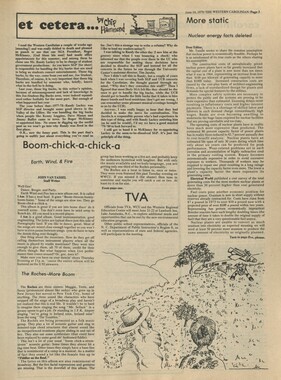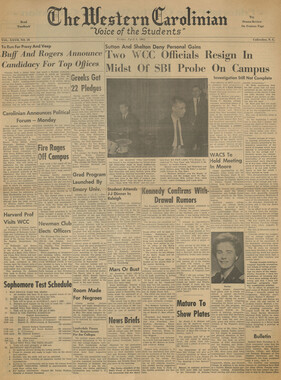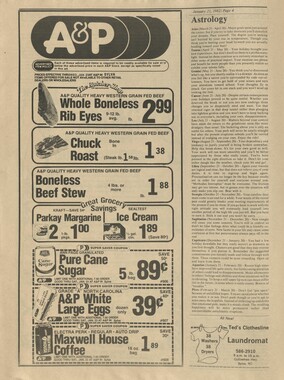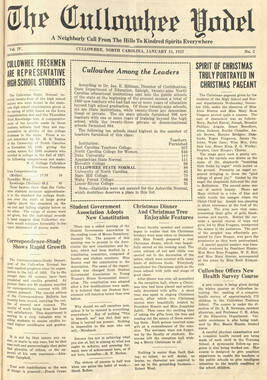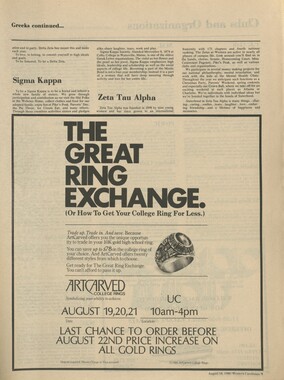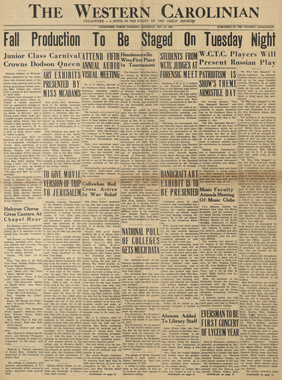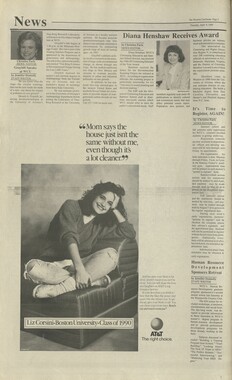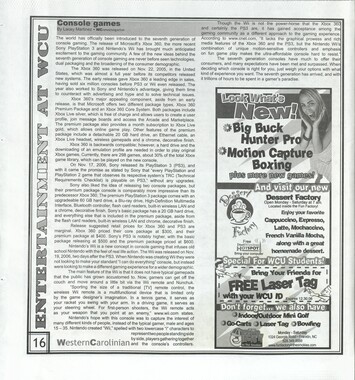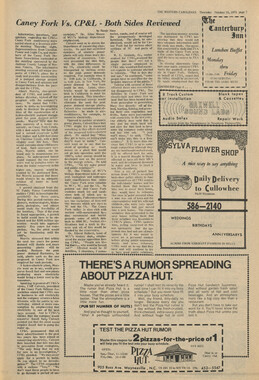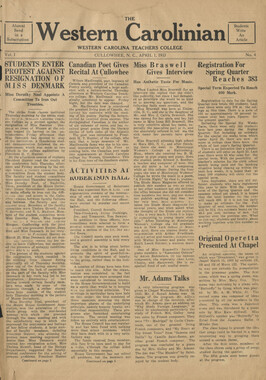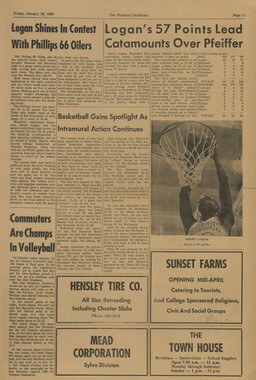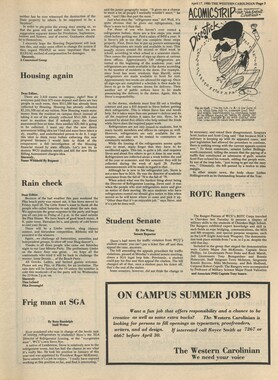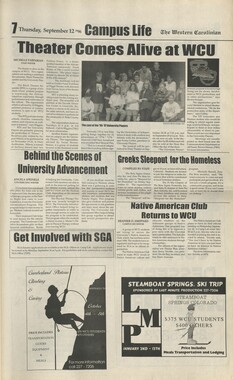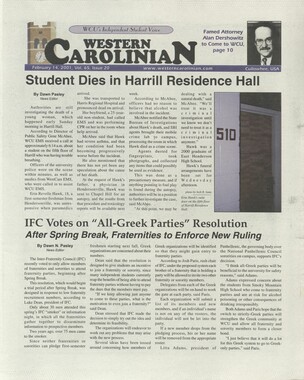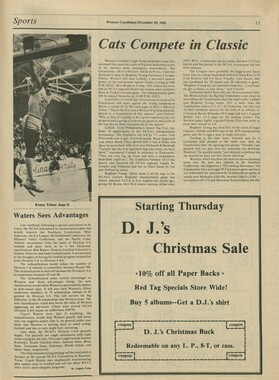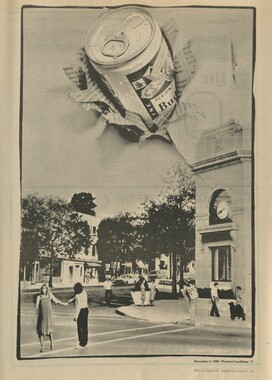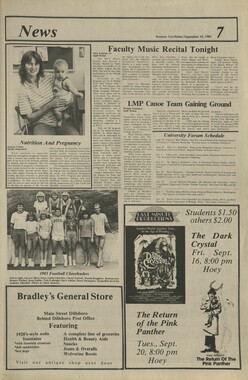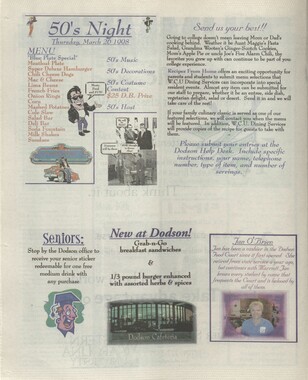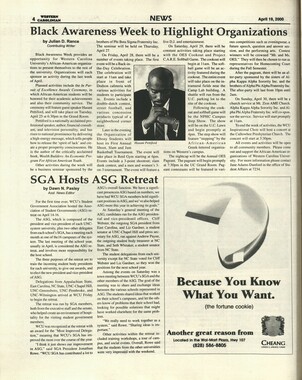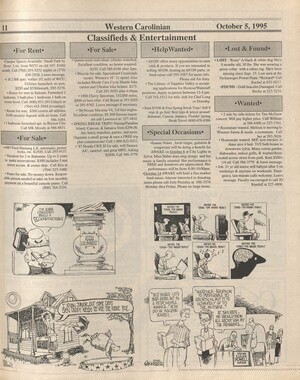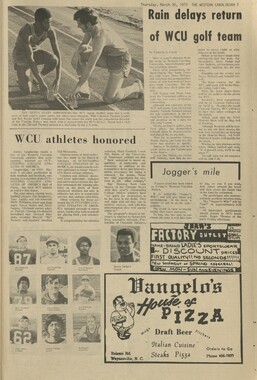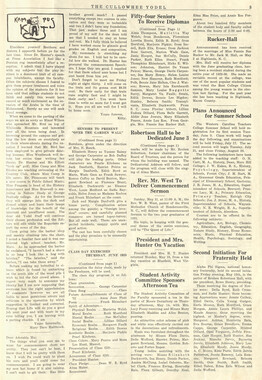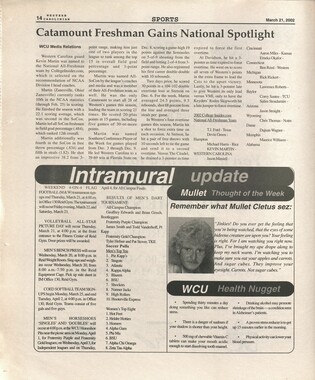Western Carolina University (20)
View all
- Canton Champion Fibre Company (2308)
- Cherokee Traditions (291)
- Civil War in Southern Appalachia (165)
- Craft Revival (1942)
- Great Smoky Mountains - A Park for America (2946)
- Highlights from Western Carolina University (430)
- Horace Kephart (941)
- Journeys Through Jackson (159)
- LGBTQIA+ Archive of Jackson County (85)
- Oral Histories of Western North Carolina (314)
- Picturing Appalachia (6798)
- Stories of Mountain Folk (413)
- Travel Western North Carolina (160)
- Western Carolina University Fine Art Museum Vitreograph Collection (129)
- Western Carolina University Herbarium (92)
- Western Carolina University: Making Memories (708)
- Western Carolina University Publications (2412)
- Western Carolina University Restricted Electronic Theses and Dissertations (146)
- Western North Carolina Regional Maps (71)
- World War II in Southern Appalachia (131)
University of North Carolina Asheville (6)
View all
- Allanstand Cottage Industries (62)
- Appalachian National Park Association (53)
- Bennett, Kelly, 1890-1974 (1388)
- Berry, Walter (76)
- Brasstown Carvers (40)
- Carver, George Washington, 1864?-1943 (26)
- Cathey, Joseph, 1803-1874 (1)
- Champion Fibre Company (233)
- Champion Paper and Fibre Company (297)
- Cherokee Indian Fair Association (16)
- Cherokee Language Program (22)
- Crowe, Amanda (40)
- Edmonston, Thomas Benton, 1842-1907 (7)
- Ensley, A. L. (Abraham Lincoln), 1865-1948 (275)
- Fromer, Irving Rhodes, 1913-1994 (70)
- George Butz (BFS 1907) (46)
- Goodrich, Frances Louisa (120)
- Grant, George Alexander, 1891-1964 (96)
- Heard, Marian Gladys (60)
- Kephart, Calvin, 1883-1969 (15)
- Kephart, Horace, 1862-1931 (313)
- Kephart, Laura, 1862-1954 (39)
- Laney, Gideon Thomas, 1889-1976 (439)
- Masa, George, 1881-1933 (61)
- McElhinney, William Julian, 1896-1953 (44)
- Niggli, Josephina, 1910-1983 (10)
- North Carolina Park Commission (105)
- Osborne, Kezia Stradley (9)
- Owens, Samuel Robert, 1918-1995 (11)
- Penland Weavers and Potters (36)
- Roberts, Vivienne (15)
- Roth, Albert, 1890-1974 (142)
- Schenck, Carl Alwin, 1868-1955 (1)
- Sherrill's Photography Studio (2565)
- Southern Highland Handicraft Guild (127)
- Southern Highlanders, Inc. (71)
- Stalcup, Jesse Bryson (46)
- Stearns, I. K. (213)
- Thompson, James Edward, 1880-1976 (226)
- United States. Indian Arts and Crafts Board (130)
- USFS (683)
- Vance, Zebulon Baird, 1830-1894 (1)
- Weaver, Zebulon, 1872-1948 (58)
- Western Carolina College (230)
- Western Carolina Teachers College (282)
- Western Carolina University (1899)
- Western Carolina University. Mountain Heritage Center (18)
- Whitman, Walt, 1819-1892 (10)
- Wilburn, Hiram Coleman, 1880-1967 (73)
- Williams, Isadora (3)
- Cain, Doreyl Ammons (0)
- Crittenden, Lorraine (0)
- Rhodes, Judy (0)
- Smith, Edward Clark (0)
- Appalachian Region, Southern (2569)
- Asheville (N.C.) (1923)
- Avery County (N.C.) (26)
- Blount County (Tenn.) (195)
- Buncombe County (N.C.) (1672)
- Cherokee County (N.C.) (283)
- Clay County (N.C.) (555)
- Graham County (N.C.) (233)
- Great Smoky Mountains National Park (N.C. and Tenn.) (519)
- Haywood County (N.C.) (3569)
- Henderson County (N.C.) (70)
- Jackson County (N.C.) (4804)
- Knox County (Tenn.) (35)
- Knoxville (Tenn.) (13)
- Lake Santeetlah (N.C.) (10)
- Macon County (N.C.) (420)
- Madison County (N.C.) (215)
- McDowell County (N.C.) (39)
- Mitchell County (N.C.) (132)
- Polk County (N.C.) (35)
- Qualla Boundary (981)
- Rutherford County (N.C.) (76)
- Swain County (N.C.) (2135)
- Transylvania County (N.C.) (270)
- Watauga County (N.C.) (12)
- Waynesville (N.C.) (86)
- Yancey County (N.C.) (72)
- Aerial Photographs (3)
- Aerial Views (60)
- Albums (books) (4)
- Articles (1)
- Artifacts (object Genre) (228)
- Bibliographies (1)
- Biography (general Genre) (2)
- Cards (information Artifacts) (38)
- Clippings (information Artifacts) (191)
- Copybooks (instructional Materials) (3)
- Crafts (art Genres) (622)
- Depictions (visual Works) (21)
- Design Drawings (1)
- Drawings (visual Works) (185)
- Envelopes (73)
- Exhibitions (events) (1)
- Facsimiles (reproductions) (1)
- Fiction (general Genre) (4)
- Financial Records (12)
- Fliers (printed Matter) (67)
- Glass Plate Negatives (381)
- Guidebooks (2)
- Internegatives (10)
- Interviews (815)
- Land Surveys (102)
- Letters (correspondence) (1013)
- Manuscripts (documents) (618)
- Maps (documents) (177)
- Memorandums (25)
- Minutes (administrative Records) (59)
- Negatives (photographs) (6015)
- Newsletters (1290)
- Newspapers (2)
- Notebooks (8)
- Occupation Currency (1)
- Paintings (visual Works) (1)
- Pen And Ink Drawings (1)
- Periodicals (193)
- Personal Narratives (10)
- Photographs (12976)
- Plans (maps) (1)
- Poetry (5)
- Portraits (4539)
- Postcards (329)
- Programs (documents) (151)
- Publications (documents) (2364)
- Questionnaires (65)
- Relief Prints (26)
- Sayings (literary Genre) (1)
- Scrapbooks (282)
- Sheet Music (2)
- Slides (photographs) (402)
- Songs (musical Compositions) (2)
- Sound Recordings (796)
- Specimens (92)
- Speeches (documents) (15)
- Tintypes (photographs) (8)
- Transcripts (322)
- Video Recordings (physical Artifacts) (23)
- Text Messages (0)
- A.L. Ensley Collection (275)
- Appalachian Industrial School Records (7)
- Appalachian National Park Association Records (336)
- Axley-Meroney Collection (2)
- Bayard Wootten Photograph Collection (20)
- Bethel Rural Community Organization Collection (7)
- Blumer Collection (5)
- C.W. Slagle Collection (20)
- Canton Area Historical Museum (2110)
- Carlos C. Campbell Collection (462)
- Cataloochee History Project (64)
- Cherokee Studies Collection (4)
- Daisy Dame Photograph Album (5)
- Daniel Boone VI Collection (1)
- Doris Ulmann Photograph Collection (112)
- Elizabeth H. Lasley Collection (1)
- Elizabeth Woolworth Szold Fleharty Collection (4)
- Frank Fry Collection (95)
- George Masa Collection (173)
- Gideon Laney Collection (452)
- Hazel Scarborough Collection (2)
- Hiram C. Wilburn Papers (28)
- Historic Photographs Collection (236)
- Horace Kephart Collection (861)
- Humbard Collection (33)
- Hunter and Weaver Families Collection (1)
- I. D. Blumenthal Collection (4)
- Isadora Williams Collection (4)
- Jesse Bryson Stalcup Collection (47)
- Jim Thompson Collection (224)
- John B. Battle Collection (7)
- John C. Campbell Folk School Records (80)
- John Parris Collection (6)
- Judaculla Rock project (2)
- Kelly Bennett Collection (1407)
- Love Family Papers (11)
- Major Wiley Parris Civil War Letters (3)
- Map Collection (12)
- McFee-Misemer Civil War Letters (34)
- Mountain Heritage Center Collection (4)
- Norburn - Robertson - Thomson Families Collection (44)
- Pauline Hood Collection (7)
- Pre-Guild Collection (2)
- Qualla Arts and Crafts Mutual Collection (12)
- R.A. Romanes Collection (681)
- Rosser H. Taylor Collection (1)
- Samuel Robert Owens Collection (94)
- Sara Madison Collection (144)
- Sherrill Studio Photo Collection (2558)
- Smoky Mountains Hiking Club Collection (616)
- Stories of Mountain Folk - Radio Programs (374)
- The Reporter, Western Carolina University (510)
- Venoy and Elizabeth Reed Collection (16)
- WCU Gender and Sexuality Oral History Project (32)
- WCU Mountain Heritage Center Oral Histories (25)
- WCU Oral History Collection - Mountain People, Mountain Lives (71)
- WCU Students Newspapers Collection (1843)
- Western North Carolina Tomorrow Black Oral History Project (69)
- William Williams Stringfield Collection (2)
- Zebulon Weaver Collection (109)
- African Americans (390)
- Appalachian Trail (35)
- Artisans (521)
- Cherokee art (84)
- Cherokee artists -- North Carolina (10)
- Cherokee language (21)
- Cherokee pottery (101)
- Cherokee women (208)
- Church buildings (172)
- Civilian Conservation Corps (U.S.) (111)
- College student newspapers and periodicals (1933)
- Dams (107)
- Dance (1023)
- Education (222)
- Floods (61)
- Folk music (1015)
- Forced removal, 1813-1903 (2)
- Forest conservation (220)
- Forests and forestry (1184)
- Gender nonconformity (4)
- Great Smoky Mountains National Park (N.C. and Tenn.) (181)
- Hunting (45)
- Landscape photography (25)
- Logging (119)
- Maps (83)
- Mines and mineral resources (8)
- North Carolina -- Maps (18)
- Paper industry (38)
- Postcards (255)
- Pottery (135)
- Railroad trains (72)
- Rural electrification -- North Carolina, Western (3)
- School integration -- Southern States (2)
- Segregation -- North Carolina, Western (5)
- Slavery (5)
- Sports (452)
- Storytelling (243)
- Waterfalls -- Great Smoky Mountains (N.C. and Tenn.) (66)
- Weaving -- Appalachian Region, Southern (280)
- Wood-carving -- Appalachian Region, Southern (328)
- World War, 1939-1945 (173)
Western Carolinian Volume 55 Number 03
Item
Item’s are ‘child’ level descriptions to ‘parent’ objects, (e.g. one page of a whole book).
-
-
CZ#£ cWtES(rnR3t CsvRPLi*QA*L VOLUME 55, NUMBER 3 Thursday, Sept 7,1989 Cullowhee, North Carolina The Voice of The Student Body WCU's Board of Trustees Elects Officers, Approves Annual Fee Increases SGA Hard at Work for WCU Students Former Asheville Mayor Richard A. Wood Jr. was elected chairman of the Western Carolina University Board of Trustees Thursday by a 7-5 vote, in a contest with Sylva attorney Orville B. Coward Sr. Coward was unanimously elected vice chairman. Wood is an appointee of the University of North Carolina Board of Governors. Coward is an appointee of Gov. Jim Martin. Four new or reappointed trustees sworn in by Judge Danny Davis are Charles G. Cagle, president of Cagle and Son Ford Inc. in Sylva, also appointed by Gov. Martin; Charles Pine of Asheville, Senior Vice President of the Belk Company, and Kenneth F. Wilson of Waynesville, publisher of The Waynesville Mountaineer, both Board of Governors appointees; and William F. Forsyth of Murphy, a Cherokee County real estate developer, reappointed by the Board of Governors. Annual fee increases effective in the Fall of 1990 of $9 for athletics and $7 for University Center debt retirement were approved by the new board after CJ. Carter, Vice Chancellor of Business Affairs, assured the board that the fees were "bare bones," and essential to the services. Board member Allan Allman, of Penrose, said "every year I've been on the board, I've voted for an increase, and each time I felt that I was pricing someone out of an education." Carter said that the increases would place WCU 13th in the 16-campus UNC system in total tuition and fees. In-state cost this year is $3,306 for students living on campus, and next year it will rise to $3,332. The (PtwDbyJaltMuon) Trustees (L-R) Richard Wood, Debbie Strahm, Orville Coward national average for public institutions is $6,600, Carter noted, "which shows that WCU is offering one of the best bargains in the U.S." Several trustees questioned the athletics fees. Coward noted that the WCU budget is the lowest in the Southern Conference. William Forsyth, of Murphy, called for a full presentation on athletics at the next board session and Brent Taylor, student trustee, said most students want WCU to continue to play big-name schools in football. Athletics Director Bobby N. Setzer told the trustees that Western must continue to schedule at least two Division IA football schools each season as revenue-producing engage ments until Western's own fund-raising efforts produce more money for athletics. After lengthy discussion, Wood said that he intends to name a new standing board committee on athletic affairs to provide broad oversight for the trustees. The board authorized a nine-member task force to examine athletic budget needs and recommend action. Included on the task force will be three trustees, the Athletic Director, the chairman of the Faculty Senate Athletics Committee, Chancellor Myron Coulter or his designee, and representatives of the Alumni Association, the Catamount Club, and the student body. By Aletha Hyatt Many people believe that the Student Government Association does not do very much on this campus. But according to President Brent Taylor, that isn't true. President Taylor says that "just like our own government, SGA has a Legislative Branch, a Judicial Branch, and an Executive Branch." These branches perform different functions, but all are working to improve student life. SGA's Legislative Branch, run by Vice-President Bob Hammer, is comprised of Senators voting on resolutions and bills. One bill being considered now calls for placing a water fountain at the intramural fields on campus. "The Senate also oversees a budget of approximately $100,000," says Taylor. This money is distributed to several of Western's organizations at the end of the Spring semester, after a new SGA president takes office. The Judicial Branch of the Student Government Association guarantees the students' rights to a SGA President Brent Taylor fair trial by their peers, concerning speeding tickets, parking tickets, and violations where towing is involved. Any student has the right to appeal a citation that he or she may feel is unjust, and President Taylor encour ages students to do just that. Future plans include expansion into other areas where students may feel they have been treated unfairly, such as housing rules and regulations. Students would have the right to appeal write-ups or suspensions through the Judicial Branch of SGA. According to Taylor, "our Executive Branch is different from the United States Executive Branch, which enforces laws. SGA's Executive Branch provides services." Some of these services are expected to begin as early as September. The services will include weekly newsletters informing all students of campus activities, campus directories, the Stray Cat Security Escort Service, and a discount card that students can use throughout the area. The Executive Branch is also involved in many statewide meetings and conferences which get the students' wants and needs heard by state officials. Enrollment, Admissions Standards up for '90; Enrollment Rise Expected to Continue By Connie Wishon Senator Bradley to Speak at Centennial Kick-Off The Fall Semester of the 1989-90 year has been a successful one for Western Carolina University. Not only is the university celebrating 100 years of existence, but it is also enjoying an increase in enrollment. Preliminary figures from the Admissions Office showthat enrollment is up by 200 students from last year, an 18% increase in the freshman class. "The attitude of the incoming students appears to be more serious, creating more competitiveness," stated Drumont Bowman, WCU's Di rector of Admissions. According to Bowman, the average SAT scores of the freshman class rose ten to fifteen points, reflecting this serious attitude. Due to stricter academic requirements implemented by the university, over 1,000 applicants were denied admission to Western last spring. The influx of students has not posed problems with housing, despite previous expectations. According to Randy Rice, Directorof University Housing, the residence halls are accommodating students com fortably. Rice stated that many private rooms are now available to those who were placed on the waiting list last spring. Expectations for fall 1990 are high. Thus far, over 9,000 requests for catalogs have been received by the Admissions Office. Although the number of high school graduates is predicted to decline from 1993 on, Western's enrollment should stabilize through the 90's if the present trend continues. UNC System Institutes Regular Tuition Hikes CULLOWHEE—U.S. Sen. Bill Bradley (D-N.J.), who helped rewrite the federal tax code 20 years after he rewrote collegiate basketball scoring records, will be the keynote speaker Friday, Sept. 29, when Western Carolina University tips off its year-long centennial observance. Bradley's address will be at 11 a.m. in the Ramsey Regional Activity Center, ft is free and open to the public. Bradley gained national political prominence after his work on the Tax Reform Act of 1986. His priorities since he was elected to the Senate in 1979 have been tax reform, education, health, and the environment. He has introduced several education bills, sponsored the Child Support Enforcement Act, and worked to secure funding for immunizations for children worldwide. His efforts to preserve the environment include helping establish a system to track hospital waste, encouraging the use of satellite monitor- Senator Bill Bradley ing to impede illegal ocean dumping, and supporting a "super fund" to clean up toxic waste. A 1965 graduate of Prince ton University and a Rhodes Scholar, Bradley was named an All-America basketball player three times and broke tournament scoring records his senior year. He was captain of the 1964 U.S. Olympic basketball team that won the gold medal, and during his 10-year career with the New York Knickerbockers, the team was NBA champion twice. Bradley has written two books, "Life on the Run" and 'The Fair Tax." Western's Second Century Day activities, after Bradley's address, will include campus tours, a theatrical production about the university's growth and history, and a performance by the Cullowhee Music Festival Orchestra. For more information, contact Dr. Judy Dowell, chairman of the Centennial committee, Western Carolina University, Cullowhee, N.C. 28723, telephone (704) 227-7100. By Aletha Hyatt This past summer, parents and students may have noticed something strange in Western Carolina University's billing process. Many students may have been sent two bills, the first showing one tuition price, and the second showing an increased rate. Many people are wondering what is going on. Toward the end of their 1989 session, North Carolina's General Assembly proposed a raise in tuition fees. This proposal was then sent to the Board of Governors for the Stats College System, where it was approved and placed into effect in early August. The first bills had been sent before the increase was finalized. The increase reflected in the second billings amounted to 20% for in-state students, and 15% for out-of-state students. The increase will mean an additional $44.00 in tuition costs for an in-state student, and approximately $311.00 for an out-of-state student. The hike can be expected every other year for in-state students, and every year for out-of-state students. In-state students depending on financial aid may receive assistance in offsetting the hike. Depending on what type of grant a student has, they could be compensated somewhat for the higher tuition price. According to William G. Hardesty, Director of Student Financial Aid, "we anticipated a tuition increase and as a result we increased our budget to compensate for that. We did not increase our budget enough to compensate for the increase that occurred for out- of-state students." This could make things hard for an out-of-state student who relies on financial aid for their tuition. If you have any questions concerning where you stand with the tuition hike, contact the Financial Aid office, located in HFR Administration Building, 227-7290. Construction Resumes; WCU's Alumni Tower Nearing Completion By Clif Pait Despite early summer rain and minor construction problems, the new Alumni Tower should be completed by the end of September. Construction was hampered for 45 days by problems with specially shaped bricks at the base of the tower. Fortunately, these problems arose at the same time as the abundant rain, so that more time was not lost. The tower will rise to a height of 66 feet 6 inches. The base of the tower itself is approximately 18 feet square, surrounded by brick pavement 60 feet square. An electronic carillon will be heard through four speakers in the top of the tower. The musical programs have the capacity to be heard from two miles away. The Carillon itself will be stored and programmed in the Music/ English Building. The tower will be a focal point to the past as well as to the future. Hanging in the archway of the tower will be part of WCU's history: the Victory Bell. Beneath the tower will be a time capsule which should be placed there at the end of the Centennial year. A committee will be selected to determine what will be placed in the capsule. No date has been set for its opening. The tower is being con structed by the F.N. Thompson Construction Company of Charlotte. "We are really getting a $400,000 tower for $325,000, with much thanks to Arnold Isaacs," states Jim Manring, the Alumni Director. Isaacs is the president of the F. N. Thompson Company and a 1958 alumnus of WCU. Manring estimates that every item, including pre-cast sections, the architect's work, and the mason work, was provided below the normal cost. Architect Christopher G. Ions of Clark, Tribble, Harris and Li, a subcontractor of the F.N. Thompson Company, worked with the alumni and the Chancellor to design the tower. To choose how often and what the 48 note carillon will play, a committee headed by Dr. James E. Dooley, the Vice-Chancellor for Devel opment and Special Services, hat been appointed. The committee consists of Rosemary Cook, a music student; Mrs. Elsie Brown, a member of the Cullowhee community; Dr. Robert Kehrberg, the Music Department Head; Kathy Boydston, the President- Elect of the Alumni Association; Dr. Andy Latorreof the School of Technology and Applied Sciences; and Chancellor Myron L Coulter. Funds for the Alumni Tower have been raised through gifts to the Alumni Association. Presently, approximately $277,000 has been pledged to the tower. Students are encouraged to make donations. The Alumni Tower is the official symbol of the University's Centennial and will be prominent throughout the 1989-90 celebration. Shirts, pens, mugs and other commodities bearing a picture of the tower are already available at the WCU Bookstore. One can even get the symbol inscribed on a class ring. The tower will give the Alumni as a group a higher visibility," states Manring. He also hopes the tower will "be an inspiration to the students, leading them to become proud alumni of Western." fffBHRiRi; ..miui.i[..,...i....,i...L lilllll ■XvXvX ■:-.-:■:■:-: What's i ■■»' ■.■■;. ■ ■; ■; ..■.■.■■■■.:■■.■■■ ' ' . ■ :■:■:■:•:■:•:■:-:■:■;■:-:>-;;v :-:::■:■:>::-~v-;-: ::-::-:-:-:v:-:-x:■:-:-:.:.;■: atitWK : mm?. wm III 81* Ep Voile A Look M "WWt&Bac LMPActlvlti CAfAMOUNTS . WCU Ch*rr.e*,der* Music Clinics to be Held The first of five annual "September Series" Orff-Schulwerk training courses offered by WCU's Music department will be held Sept 22 - 23, with guest clinic leader Konnie Saliba. Saliba, head of Orff-Schulwerk programs at Memphis State University and world-acclaimed music teacher, has taught Orff- Schulwerk training courses at WCU every year since 1981. She is author of many Orff training books and materials. Registration for this year's inaugural "September Series" course will be on Friday, Sept. 22, at 5:30 p.m. in the Music/English Building. Classes will be held Friday, Sept. 22, from 6 to 10 p.m and Saturday, Sept. 23, from 9 a.m. to 4 p.m. One unit of continuing education credit is available for the 10-hour course. Enrollment is limited. Under the "September Series," Orff-Schulwerk training workshops will take place at WCU during five consecutive Septembers. The Orff-Schulwerk process, a comprehensive approach to music education, encompasses chanting, singing, movement, analysis of musical form, note-reading and the playing of xylophones, met- allophones and percussion instruments. In 1986, WCU established a Master of Music Education degree which may be completed during summers only. The degree features a concentration in the Orff-Schulwerk process. Three public schoolteachers have graduated from the program, and three more are expected to graduate during the summer of 1990. For more information about the "September Series" course or WCU's Orff-Schulwerk program, contact Eva Adcock, Orff- Schulwerk coordinator, Department of Music, Western Carolina University, Cullowhee, N.C, 28723; telephone (704) 227-7242.
Object
Object’s are ‘parent’ level descriptions to ‘children’ items, (e.g. a book with pages).
-
The Western Carolinian is Western Carolina University's student-run newspaper. The paper was published as the Cullowhee Yodel from 1924 to 1931 before changing its name to The Western Carolinian in 1933.
-
